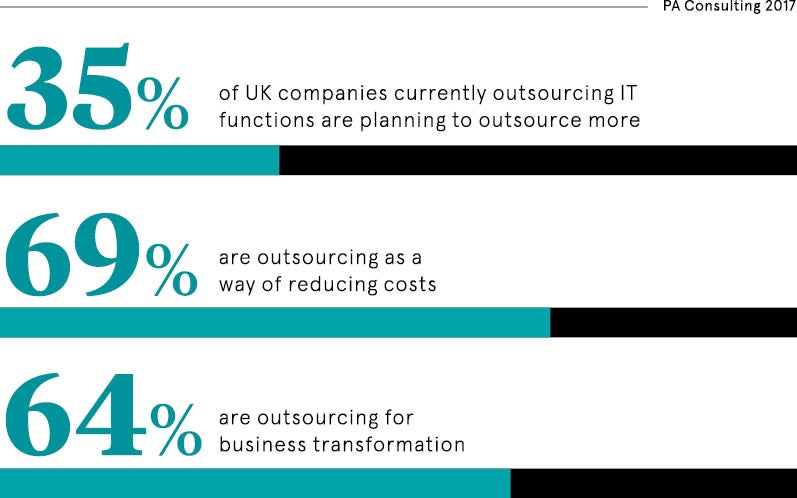The digital revolution hasn’t just broadened the reach of the global economy, it has extended the very boundaries of the firm. Outsourcing has become second nature to most companies, which today partner with specialists in design, IT and business process management (BPM) to market, reorganise and grow their businesses.
In the private sector, the outsourcing market has soared, growing a compound 36 per cent year on year since 2015, according to the Arvato Outsourcing Index. In 2017, the total value of outsourcing contracts rose 9 per cent, reaching a three-year high of £4.93 billion. Yet the term “outsourcing” remains very much a dirty word, leading to the question has the sector outgrown the term?

In its earliest incarnations, outsourcing meant contracting out work that was previously undertaken in-house. In the public consciousness, for that reason, it conjures images of redundancies, labour arbitrage, a lowering of labour standards and reduced accountability.
For consumers, it recalls frustrating experiences of cost-cutting customer services and scripted call centre conversations. The stigma attached to the term is kept alive by successive public sector outsourcing scandals, even as the private sector makes efforts to learn from past mistakes.
Companies in the private sector have strove to improve the quality of outsourced customer services, with many exchanging contracts with offshored call centres to outsourcers based in the UK. In 2017, mobile company EE announced that all its customer calls would be handled in the UK or Ireland, creating 1,000 new jobs at its sites in North Tyneside, Darlington, Plymouth and Merthyr Tydfil. Also in 2017, Vodafone announced plans to bring 2,100 customer service jobs back to the UK from South Africa, India and Egypt.
Despite its visibility to consumers, customer services represents just a fraction of the services that are outsourced. Indeed, the sector has flourished because it is dominated by tech. The vast bulk of the outsourcing industry in the UK, 73 per cent in 2017, was comprised of information technology outsourcing (ITO) contracts. And that volume is doubling year on year. UK businesses spent more than twice as much on ITO outsourcing in 2017 (£3.82 billion) as they did in 2016 (£1.73 billion). The sector is evolving at a pace that means most companies will never have the expertise to undertake new hosting services, network infrastructure and application management in-house.
The lean startup model has also radically reoriented the business environment. Companies of all sizes have responded to a market that rewards agility and accordingly are concentrating resources on their core competencies. For scrappy startups, especially, the support of specialist partners in compliance and legal services, human resources and payroll, accounting and IT not only spreads risk, but provides an opportunity to lean on external expertise.
Increasingly, outsourced back offices are perceived as adding value, rather than cutting costs. In 2017, UK companies spent £1.80 billion on BPM deals, representing 26 per cent of all outsourced services.
If any recent development is to challenge the former boundaries of the firm, it is online labour platforms. Sites such as Upwork, Peopleperhour and Freelancer give companies the ability to source independent work from skilled individuals on a flexible part-time basis. A recent Oxford Internet Institute report argues: “Online freelancing platforms are transforming work, organisations and their business models.” Similarly, Accenture has identified online labour platforms as part of a major trend that it says will significantly transform existing organisational forms and management models by 2022.
Companies that provide automation services also, interestingly, fall within the outsourcing market. In a case study of just how diverse this market is, there are players from the BPM sector potentially posing a threat to parts of the ITO sector. For BMP, robotic process automation (RPA) represents a high growth area.
RPA involves the programming of software robots, or bots, to mimic the way people use user interface applications, such as Excel spreadsheets and customer relations management programs, enabling companies to automate routine, repetitive data management tasks that administrators would otherwise do. The most obvious applications are in data management, but more advanced uses include email triage and payroll functions.
When marketing RPA, companies tend to lean heavily upon this anthropomorphic parallel. “The messaging about RPA as a digital workforce is driven by the need for marketing traction and adoption,” David Brakoniecki, managing director of the process automation firm BP3 Global, notes. “A digital workforce of bots that can work 24 hours a day is a powerful analogy, with direct implications for some segments of the outsourcing industry.”
We will not survive if we remain in the constricted space of doing as we are told, depending solely on cost-arbitrage
Mr Brakoniecki says the best ITO companies are already automating at least some of their clients’ processes and communicating this process as added value. Vishal Sikka, executive vice chairman of Infosys, the Indian IT and business consulting giant, told staff last year: “We will not survive if we remain in the constricted space of doing as we are told, depending solely on cost-arbitrage. If we don’t, we will be made obsolete by the tidal wave of automation and technology-fuelled transformation that is almost upon us.”
BP3 Global’s Mr Brakoniecki observes: “Technology doesn’t stand still,” noting that in the not too distant future, RPA itself will become redundant as companies replace their legacy systems and user interface application with application programming interface software. Indeed, when machine-learning meets the mass market, outsourcing partners will be on hand to guide their clients through the digital transformation.
By then, “outsourcing”, a term that already feels outdated, will seem entirely redundant. The firm of the future will be a “corporate marketplace”, Accenture argues, that combines on-demand labour platforms and online work management solutions. Whatever you call it, don’t call it outsourcing.





